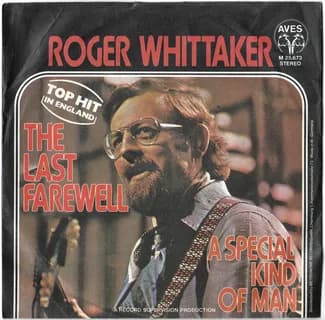
“The Last Farewell”: A Timeless Ballad of Longing and Farewell
Roger Whittaker’s “The Last Farewell” is a song that resonates with an eternal sense of wistfulness, capturing the ache of departure and the bittersweet beauty of cherished memories. Released as part of his 1971 album New World in the Morning, this hauntingly beautiful piece became one of Whittaker’s most iconic songs, cementing his legacy as a masterful interpreter of poignant ballads. With music by Whittaker and lyrics drawn from a poem by Ron A. Webster, the song’s journey from a radio contest to worldwide acclaim is as captivating as the melody itself.
The origins of “The Last Farewell” are as remarkable as the song. Whittaker, known for his velvety baritone and gentle charm, hosted a UK radio program where he invited listeners to send in their poems for him to set to music. From a staggering million submissions, Ron A. Webster’s evocative verses stood out. Webster, a silversmith from Birmingham, crafted his lyrics on a cold, rainy evening, longing for warmer shores and inspired by dreams of distant seas and exotic lands. His poetic reflection became the backbone of a song that would touch millions.
“The Last Farewell” remained a hidden gem for a few years, tucked away among Whittaker’s catalog. However, when it caught the attention of US radio stations in 1975, its poignant narrative and majestic orchestration propelled it to international stardom. The song climbed the charts, reaching number 2 in the US and achieving immense success in Canada, the UK, and across Europe.
The lyrics of “The Last Farewell” are a masterclass in storytelling. They evoke vivid imagery of a sailor bidding goodbye to his beloved, standing on the shores of an unnamed but idyllic land. The lines:
“For you are beautiful, and I have loved you dearly, more dearly than the spoken word can tell,”
convey an unspoken depth of emotion, blending the universal themes of love, loss, and the inexorable pull of duty. Whittaker’s soaring voice, accompanied by lush orchestration, elevates the song into an anthem of grandeur and introspection.
Musically, “The Last Farewell” reflects Whittaker’s unparalleled ability to merge folk sensibilities with classical influences. The sweeping string arrangements and his signature whistling lend the song a timeless quality, transporting listeners to a bygone era of tall ships and distant horizons. It’s no surprise that the song became a staple on international charts and a favorite at countless farewell ceremonies, from personal goodbyes to state functions.
What sets “The Last Farewell” apart is its universal appeal. It speaks to the wanderer in all of us, those moments of parting that leave indelible marks on our hearts. Whether bidding adieu to a loved one, a cherished homeland, or a fleeting moment in time, the song encapsulates the fragile beauty of goodbyes.
For Roger Whittaker, the success of “The Last Farewell” marked a pinnacle in a career defined by authenticity and emotional resonance. Decades after its release, the song continues to hold a special place in the hearts of listeners, a timeless reminder that farewells, while painful, are an intrinsic part of life’s journey.